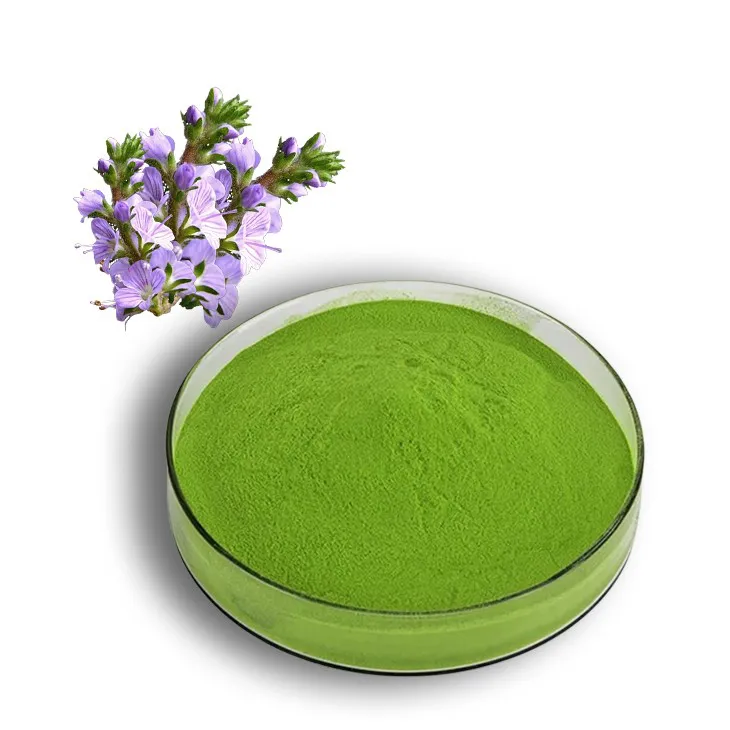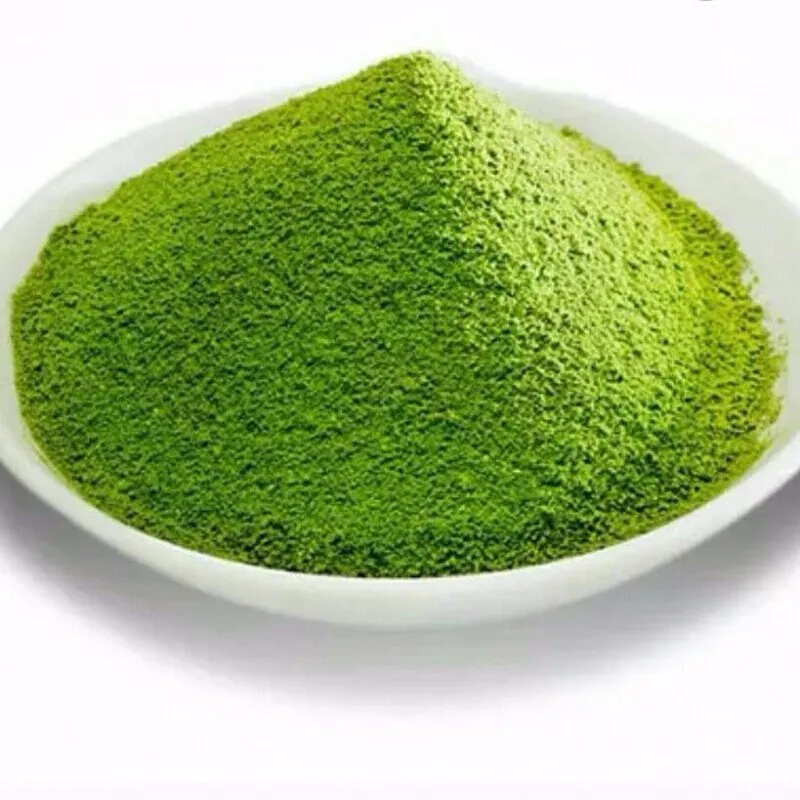- 0086-571-85302990
- sales@greenskybio.com
Benefits of Alfalfa Meal in Cattle Feed.
2024-11-12

1. Introduction
Alfalfa Meal has long been recognized as a valuable component in cattle feed. It offers a wide range of benefits that contribute to the overall health, growth, and productivity of cattle. This article will explore in detail the various advantages that Alfalfa Meal brings to cattle nutrition.

2. Protein - The Building Block for Muscle Development
Protein is an essential nutrient for cattle, and Alfalfa Meal is a rich source of it. Cows, like all animals, require protein for numerous physiological functions, especially muscle development and growth.
2.1 Importance of Muscle Development in Cows
Muscle development is crucial for cows for several reasons. In beef cattle, well - developed muscles are directly related to the quality and quantity of meat production. A higher muscle mass means more lean meat, which is highly valued in the market. For dairy cows, muscle strength is necessary for proper movement and posture, which in turn affects their ability to graze, stand, and lie down comfortably. This is important for their overall well - being and milk production.
2.2 How Alfalfa Meal Supplies Protein
Alfalfa meal contains a significant amount of high - quality protein. The amino acids present in alfalfa protein are in a form that is easily digestible by cattle. When cows consume alfalfa meal, the digestive system breaks down the protein into its constituent amino acids, which are then absorbed into the bloodstream and transported to the cells where they are used for muscle protein synthesis. This process ensures that the cows have the necessary building blocks to develop and maintain strong muscles.

3. Essential Vitamins and Minerals
Alfalfa meal is not only a source of protein but also contains essential vitamins and minerals that are vital for the overall health of cattle.
3.1 Calcium - The Bone Builder
Calcium is one of the most important minerals in a cow's diet. It is essential for the development and maintenance of strong bones. In dairy cows, calcium is also required in large amounts for milk production. During lactation, cows can lose a significant amount of calcium through milk, and a deficiency can lead to problems such as milk fever. Alfalfa meal provides a natural source of calcium, helping to meet the cow's calcium requirements and prevent calcium - related disorders.
3.2 Vitamin A - For Vision and Immune Function
Vitamin A is crucial for cattle. It plays a key role in maintaining good vision, which is important for cows to navigate their environment, find food, and avoid predators. Additionally, vitamin A is essential for a strong immune system. Cows with sufficient vitamin A levels are better able to resist diseases and infections. Alfalfa meal contains carotenoids, which are precursors to vitamin A. Once consumed by the cows, the carotenoids are converted into vitamin A in their bodies, ensuring an adequate supply of this vital vitamin.
3.3 Other Vitamins and Minerals
In addition to calcium and vitamin A, alfalfa meal also contains other important vitamins and minerals such as phosphorus, potassium, and various B - vitamins. Phosphorus is involved in energy metabolism and bone formation. Potassium helps in maintaining proper fluid balance and nerve function. The B - vitamins play a role in various metabolic processes, including digestion and energy production.

4. High Fiber Content - Aiding Digestion
The high fiber content of alfalfa meal is another significant benefit in cattle feed. Fiber is an essential part of a cow's diet, especially for proper digestion.
4.1 The Role of Fiber in Cattle Digestion
Cattle are ruminants, which means they have a unique digestive system designed to handle large amounts of fiber. The rumen, the largest compartment of the cow's stomach, is home to a complex community of microorganisms. These microorganisms break down the fiber in the feed through a process of fermentation. The fermentation of fiber produces volatile fatty acids, which are an important source of energy for the cow.
4.2 How Alfalfa Meal's Fiber Improves Rumen Function
Alfalfa meal contains both soluble and insoluble fiber. The soluble fiber in alfalfa meal provides a readily available source of energy for the rumen microorganisms. It helps to stimulate their growth and activity, which in turn improves the efficiency of fiber digestion. The insoluble fiber, on the other hand, adds bulk to the rumen contents, promoting proper rumen motility. This helps to prevent problems such as rumen acidosis, which can occur when the rumen pH drops too low due to improper digestion.
5. Improving Feed Palatability
Alfalfa meal can also enhance the palatability of cattle feed. Cows are more likely to consume a feed that is appetizing and tastes good.
5.1 Factors Affecting Feed Palatability
There are several factors that can affect the palatability of cattle feed. These include the smell, taste, texture, and appearance of the feed. Alfalfa meal has a pleasant smell and taste, which can make the overall feed more appealing to cows. Its texture can also add variety to the feed, making it more interesting for the cows to eat.
5.2 The Impact on Cattle Feed Intake
When the palatability of the feed is improved, cows are likely to eat more. This is especially important for high - producing dairy cows and growing beef cattle, as increased feed intake is directly related to higher milk production and growth rates. By adding alfalfa meal to the feed, farmers can ensure that their cattle consume an adequate amount of nutrients, leading to better performance and productivity.
6. Conclusion
In conclusion, alfalfa meal offers a multitude of benefits in cattle feed. Its high protein content supports muscle development, essential vitamins and minerals promote overall health, high fiber content aids digestion, and it can also improve feed palatability. By incorporating alfalfa meal into their cattle feeding programs, farmers can enhance the well - being and productivity of their herds, leading to better economic outcomes in the livestock industry.
FAQ:
Question 1: How much protein does alfalfa meal typically contain?
Alfalfa meal can contain around 15 - 20% protein on average. However, the exact protein content may vary depending on factors such as the quality of the alfalfa, the harvesting time, and the processing methods.
Question 2: Can alfalfa meal replace other protein sources in cattle feed?
In some cases, it can partially replace other protein sources. Due to its relatively high protein content, it can contribute a significant amount of the required protein for cattle. But it's important to ensure a balanced diet, as different protein sources may also provide other essential nutrients that alfalfa meal alone might not cover in sufficient amounts.
Question 3: How does the fiber in alfalfa meal improve rumen function?
The fiber in alfalfa meal provides bulk in the rumen. It helps maintain the proper pH level in the rumen, which is essential for the growth of beneficial microorganisms. These microorganisms break down the fiber and other feed components, facilitating better digestion and absorption of nutrients.
Question 4: Are there any potential drawbacks of using alfalfa meal in cattle feed?
One potential drawback could be its cost in some regions. Also, if not properly stored, it may be subject to spoilage, which can lead to a reduction in nutrient quality. Additionally, over - feeding alfalfa meal may cause some digestive issues in cattle if not balanced with other feed components.
Question 5: How can farmers ensure the quality of alfalfa meal in cattle feed?
Farmers can ensure the quality by purchasing from reliable suppliers. They should look for alfalfa meal that is free from contaminants such as mold and pesticides. Analyzing the nutrient content through laboratory testing is also a good practice. Additionally, proper storage in a dry and cool place can help maintain its quality.
Related literature
- The Role of Alfalfa in Cattle Nutrition"
- "Beneficial Effects of Alfalfa Meal on Cattle Health and Productivity"
- "Alfalfa Meal: A Key Component in Cattle Feed Formulations"
- ▶ Hesperidin
- ▶ citrus bioflavonoids
- ▶ plant extract
- ▶ lycopene
- ▶ Diosmin
- ▶ Grape seed extract
- ▶ Sea buckthorn Juice Powder
- ▶ Beetroot powder
- ▶ Hops Extract
- ▶ Artichoke Extract
- ▶ Reishi mushroom extract
- ▶ Astaxanthin
- ▶ Green Tea Extract
- ▶ Curcumin Extract
- ▶ Horse Chestnut Extract
- ▶ Other Problems
- ▶ Boswellia Serrata Extract
- ▶ Resveratrol Extract
- ▶ Marigold Extract
- ▶ Grape Leaf Extract
- ▶ blog3
-
High purity olive leaf extract
2024-11-12
-
Lavender oil extraction method
2024-11-12
-
100% organic virgin sea buckthorn fruit oil
2024-11-12
-
Lotus leaf extract powder factory in China
2024-11-12
-
China aged garlic extract supplier
2024-11-12
-
Deer antler extract powder manufacturer
2024-11-12
-
Saw palmetto extract vs whole herb
2024-11-12
-
Mangosteen extract powder
2024-11-12
-
Red Wine Extract
2024-11-12
-
Avocado Extract Powder
2024-11-12
-
Milk Thistle Extract
2024-11-12
-
Longan Extract
2024-11-12
-
Eucommia Ulmoides Extract
2024-11-12
-
Moringa powder
2024-11-12
-
Soy Extract
2024-11-12
-
Andrographis Paniculata Extract Powder
2024-11-12
-
Konjac Powder
2024-11-12





















